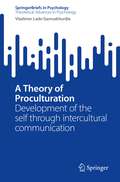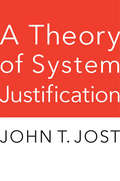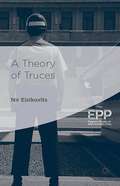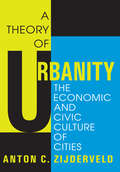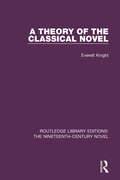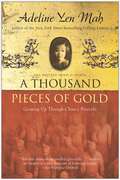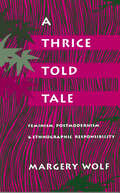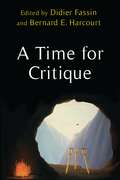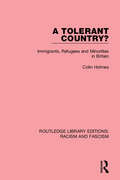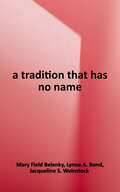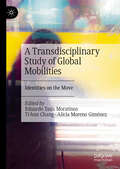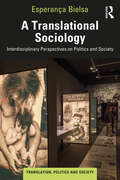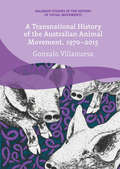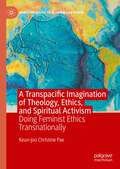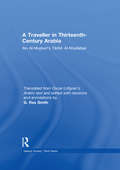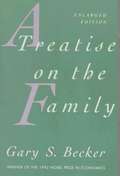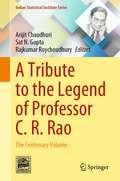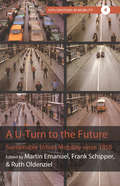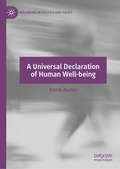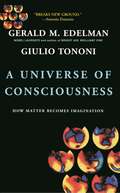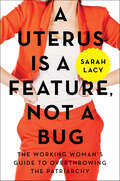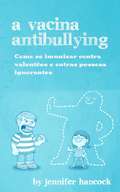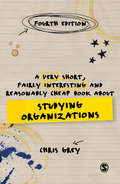- Table View
- List View
A Theory of Proculturation: Development of the self through intercultural communication (SpringerBriefs in Psychology)
by Vladimer Lado GamsakhurdiaIn each connection with new cultural contexts a new hybrid state of cultural adaptation is constructed enabling people to adjust to new conditions by creating innovative solutions for the self. This book aims to provide a brief presentation of innovative cultural psychological theory of proculturation reflecting and oriented on the understanding of semiotic and developmental dynamics of higher mental phenomena while engaging alien signs through intercultural communication. The exploration and theoretical understanding of developmental dynamics (such as self and identity construction) of people who live in immigration or multicultural, or even multi-ethnic societies, the research builds its new focus in contrasts with the acculturation theories currently present in social psychology. The theory of proculturation has been built in opposition to cross-cultural psychological theories as well as mainstream theories of acculturation research dominated by bidimensional theoretical models. Instead, this theory is constructed based on theoretical explorations which are rooted in cultural semiotics and developmental psychological paradigm on human psychology.
A Theory of System Justification
by John T. JostA leading psychologist explains why nearly all of us—including many of those who are persecuted and powerless—so often defend the social systems that cause misery and injustice. Why do we so often defend the very social systems that are responsible for injustice and exploitation? In A Theory of System Justification, John Jost argues that we are motivated to defend the status quo because doing so serves fundamental psychological needs for certainty, security, and social acceptance. We want to feel good not only about ourselves and the groups to which we belong, but also about the overarching social structure in which we live, even when it hurts others and ourselves. Jost lays out the wide range of evidence for his groundbreaking theory and examines its implications for our communities and our democracy. Drawing on twenty-five years of research, he provides an accessible account of system justification theory and its insights. System justification helps to explain deep contradictions, including the feeling among some women that they don’t deserve the same salaries as men and the tendency of some poor people to vote for policies that increase economic inequality. The theory illuminates the most pressing social and political issues of our time—why has it been so hard to combat anthropogenic climate change?—as well as some of the most intimate—why do some black children prefer white dolls to black ones and why do some people stay in bad relationships? Jost’s theory has far-reaching implications, and he offers numerous insights that political activists and social justice advocates can use to promote change.
A Theory of Truces (Palgrave Studies In Ethics And Public Policy)
by Nir EisikovitsA Theory of Truces.
A Theory of Urbanity: The Economic and Civic Culture of Cities
by Anton ZijderveldCities provide for people, not just functionally in terms of jobs, obligations and practical pursuits, but also, and above all, emotionally. We like some cities and detest others. Despite shared rationalizations and common modes of administration and design, each city has its own culture. A culture is typically human in that it contains all dimensions of the human, personal condition--from the lowest to the most sublime. Urban culture comprises both economic and civic culture, and is the source of a city's vitality. For today's urban sprawls, which have a weak and failing economic and civic culture, the task of the urban administration and various economic and civic organizations is to strengthen conditions that can prevent the emergence of urban anomie. With suburbanization, the edge city, and the emergence of cyberspace, some argue that cities, as integrated places of working and living, are things of the past. Zijderveld argues that people are and remain social animals, who like and need one another's company, particularly in their economic, socio-cultural, and political activities. Throughout the ages, cities have provided the environment in which people fulfill these needs. Anton Zijderveld discusses urban preferences, the organizations and ramifications of urbanity, the modernization of urban culture, the uneasy alliance between urbanity and the interventionist state, and the cultural dimensions of urban renewal. Zijderveld sees the economic and civic culture of the city as the centerpiece of contemporary urban management and contemporary urban democracy. In this sense, the new technology is an ally of the new urban renewal. Most postmodern treatises on the end of the city are impressionistic and unsystematic. In contrast, Zijderveld puts the qualitative dimensions of city life into focus, catching its pulse and cultural rhythms in a systematic context that prior studies have lacked. As such, it will be of great interest to urban administrators, p
A Theory of the Classical Novel (Routledge Library Editions: The Nineteenth-Century Novel #23)
by Everett KnightFirst published in 1969, this book asserts that two concepts, structure and praxis, make it impractical for scholars to ignore the necessity of a theory of the novel — with the term ‘classical novel’ used to cover western fiction. The author argues that the novel is fundamentally an ‘enterprise’ — an aspect of the praxis of a particular social class — and that the ways of orthodox scholarship are also a praxis. The investigator must enquire into the nature of their questions as those traditionally put to literature are inspired by ‘irrelevant’ nineteenth century positivism. In the author’s view the book is necessarily a theory of the classical novel and a manifesto for the student movement.
A Thousand Pieces of Gold: Growing Up Through China's Proverbs
by Adeline Yen MahIn this poignant memoir the New York Times bestselling author of Falling Leaves, Adeline Yen Mah, provides a fascinating window into the history and cultural soul of China. Combining personal reflections, rich historical insights, and proverbs handed down to her by her grandfather, Yen Mah shares the wealth of Chinese civilization with Western readers. Exploring the history behind the proverbs, she delves into the lives of the first and second emperors and the two rebel warriors who changed the course of Chinese life, adding stories from her own life to beautifully illustrate their relevance and influence today.
A Thrice-Told Tale: Feminism, Postmodernism, and Ethnographic Responsibility
by Margery WolfA Thrice-Told Tale is one ethnographer's imaginative and powerful response to the methodological issues raised by feminist and postmodernist critics of traditional ethnography. The author, a feminist anthropologist, uses three texts developed out of her research in Taiwan--a piece of fiction, anthropological fieldnotes, and a social science article--to explore some of these criticisms. Each text takes a different perspective, is written in a different style, and has different "outcomes," yet all three involve the same fascinating set of events. A young mother began to behave in a decidedly abherrant, perhaps suicidal manner, and opinion in her village was sharply divided over the reason. Was she becoming a shaman, posessed by a god? Was she deranged, in need of physical restraint, drugs, and hospitalization? Or was she being cynically manipulated by her ne'er-do-well husband to elicit sympathy and money from her neighbors? In the end, the woman was taken away from the area to her mother's house. For some villagers, this settled the matter; for others the debate over her behavior was probably never truly resolved. The first text is a short story written shortly after the incident, which occurred almost thrity years ago; the second text is a copy of the fieldnotes collected about the events covered in the short story; the third text is an article published in 1990 in American Ethnologist that analyzes the incident from the author's current perspective. Following each text is a Commentary in which the author discusses such topics as experimental ethnography, polyvocality, authorial presence and control, reflexivity, and some of the differences between fiction and ethnography. The three texts are framed by two chapters in which the author discusses the genereal problems posed by feminist and postmodernist critics of ethnography and presents her personal exploration of these issues in an argument that is strongly self-reflexive and theoretically rigorous. She considers some feminist concerns over colonial research methods and takes issues with the insistence of some feminists tha the topics of ethnographic research be set by those who are studied. The book concludes with a plea for ethnographic responsibility based on a less academic and more practical perspective.
A Time for Critique (New Directions in Critical Theory #58)
by Didier Fassin Bernard E. HarcourtIn a world of political upheaval, rising inequality, catastrophic climate change, and widespread doubt of even the most authoritative sources of information, is there a place for critique? This book calls for a systematic reappraisal of critical thinking—its assumptions, its practices, its genealogy, its predicament—following the principle that critique can only start with self-critique.In A Time for Critique, Didier Fassin, Bernard E. Harcourt, and a group of eminent political theorists, anthropologists, sociologists, philosophers, and literary and legal scholars reflect on the multiplying contexts and forms of critical discourse and on the social actors and social movements engaged in them. How can one maintain sufficient distance from the eventful present without doing it an injustice? How can one address contemporary issues without repudiating the intellectual legacies of the past? How can one avoid the disconnection between theory and action? How can critique be both public and collective? These provocative questions are addressed by revisiting the works of Foucault and Arendt, Said and Césaire, Benjamin and Du Bois, but they are also given substance through on-the-ground case studies that treat subaltern criticism in Palestine, emancipatory mobilizations in Syria, the antitorture campaigns of Sri Lankan activists, and the abolitionism of the African American critical resistance and undercommons movements in the United States. Examining lucidly the present challenges of critique, A Time for Critique shows how its theoretical reassessment and its emerging forms can illuminate the imaginative modalities to rejuvenate critical praxis.
A Tolerant Country?: Immigrants, Refugees and Minorities (Routledge Library Editions: Racism and Fascism #1)
by Colin HolmesIn this book, first published in 1991, Colin Holmes examines responses to those immigrants and refugees who have been coming to Britain since the late nineteenth century as well as the perception and treatment of British-born minorities. He attempts to explain the hostility which these groups have encountered and reveals behind complex feelings and circumstances which have often gone unrecognised.
A Tradition That Has No Name: Nurturing the Development of People, Families, and Communities
by Jacqueline S. Weinstock Mary Field Belenky Lynne A. BondMary Field Belenky, Lynne A. Bond, and Jacqueline S. Weinstock hoping to carry Belenky's theoretical work in the bestselling Women's Ways of Knowing into the realm of everyday life, created the Listening Partners project, designed to help young women isolated in rural poverty give voice to their personal and communal needs and come together to create social change. A Tradition That Has No Name explores this project and the work of other women who have created organizations to give voice to and strengthen traditions of community organizing and leadership, particularly as they have developed in communities of women marginalized by race and class. Ranging across cultures and classes--from struggling inner-city neighborhoods to affluent middle-class suburbs, from African American communities in the South to poor rural communities in Vermont--the book teaches us how to appreciate the ways women create networks of listening and community-building, and how to bring these little-recognized traditions of women's activism to the forefront of public life. It is these "public homeplaces" women create together, the authors argue, that hold the key to empowering communities and creating social change.
A Transdisciplinary Study of Global Mobilities: Identities on the Move
by Eduardo Tasis Moratinos Ti-Han Chang Alícia Moreno GiménezIdentities on the Move interrogates the categories given and adopted by people on the move through a transdisciplinary and global approach that includes social and political sciences and the arts. It brings together experiences of displacement from a variety of cultural and national backgrounds, including Brazilians, Chinese, Koreans, South Italians, Africans, Muslims, Arabophobe migrants, Iranians, Pakistanis, Bosnians, Latin Americans and Eastern Europeans. It looks at their identity-negotiating processes in different geographies across the globe, namely Japan, UK, Palestine, Italy, Australia, Europe and North America. This multi-geographical and multi-disciplinary approach allows us to decentralise previous narratives of migration by reformulating them against coloniality and invisibility and presenting them within a richer and changing contemporary map of dynamic identities. The global scale of the case studies included in this volume also allows for a wider exploration of thematic concepts within the (trans)formation of displaced identities, such as assimilation versus alienation, memory and trauma, stigmatisation, enculturation, acculturation and deculturation. In a nutshell, this volume highlights current complexities of identity formation in a global scene that is moving away from homogenous nations by presenting a multi-layered and multi-spatial notion of belonging.
A Translational Sociology: Interdisciplinary Perspectives on Politics and Society (Translation, Politics and Society)
by Esperança BielsaA Translational Sociology provides an interdisciplinary investigation of the key role of translation in society. There is a growing recognition of translation’s intervention in the intellectual history of sociology, in the international reception of social theory, and in approaches to the global literary and academic fields. This book brings attention to aspects of translation that have remained more elusive to sociological interpretation and analysis, investigating translation’s ubiquitous presence in the everyday lives of ordinary people in increasingly multilingual societies and its key intervention in mediating politics within and beyond the nation. In order to challenge a reductive view of translation as a relatively straightforward process of word substitution that is still prevalent in the social sciences, this book proposes and develops a broader definition of translation as a social relation across linguistic difference, a process of transformation that leaves neither its agent nor its object unchanged. The book offers elaborations of the social, cultural and political implications of such an approach, as a broad focus on these various perspectives and their interrelations is needed for a fuller understanding of translation’s significance in the contemporary world. This is key reading for advanced students and researchers of translation studies, social theory, cultural sociology and political sociology.
A Transnational History of the Australian Animal Movement, 1970-2015 (Palgrave Studies in the History of Social Movements)
by Gonzalo VillanuevaThis book offers the first transnational historical study of the creation, contention and consequences of the Australian animal movement. Largely inspired by Peter Singer and his 1975 book Animal Liberation, a new wave of animal activism emerged in Australia and across the world. In an effort to draw public and media attention to the plight of animals, such as the rearing of pigs and poultry in factory farms and the export of live animals to the Middle East and South East Asia, Australian activists were often innovative and provocative in how they made their claims. Through lobbying, disruptive methods, and vegan activism, the animal movement consistently contested the politics and culture of how animals were used and exploited. Australians not only observed and learnt from people and events overseas, but also played significant international roles. This book examines the complex and conflicting consequences of the animal movement for Australian politics, as well as its influence on broader social change.
A Transpacific Imagination of Theology, Ethics, and Spiritual Activism: Doing Feminist Ethics Transnationally (New Approaches to Religion and Power)
by Keun-joo Christine PaeDespite prolific feminist voices in Christian ethics, transnational perspectives are still underdeveloped. Similarly, ‘secular’ transnational feminist scholarship often overlooks religious faith, rituals, and spirituality, crucial to many women’s liberation movements across the globe. This book aims to fill these gaps in Christian and secular feminist scholarships by constructing a transnational feminist theo-ethics. Furthermore, by bringing the theological and the transnational together, the book offers an alternative tool in analyzing social identities beyond intersectionality (i.e., interstitial approach and interstitial integrity) and thus, renews feminist theological understandings, especially of time, memories, and healing beyond linear approaches. A renewed analytical tool would help the readers critically reinterrogate the global power structure buttressed by empire, militarized capitalism, and heteropatriarchal religious ideologies at the cost of raced, sexed, and classed bodies. At the same time, the book would create space where readers create and recreate theo-ethical visions for global peace and justice constructed upon transnational feminist praxis of solidarity and spiritual activism. Case studies offer concrete sites to inform readers about how to use transnational feminist theories at a micro- and macropolitical levels, and produce transnational feminist knowledge of God, spiritual activism, and solidarity. This book is written for graduate and advanced undergraduate students in religion, gender studies, and Asian/American studies to critically engage in the political, the theological, and the spiritual from transnational perspectives not as observers but as active participants in global politics.
A Traveller in Thirteenth-Century Arabia / Ibn al-Mujawir's Tarikh al-Mustabsir (Hakluyt Society, Third Series)
by G. Rex SmithThis is the first English translation of the Tarikh al-Mustabsir, written in the early quarter of the thirteenth century by Ibn al-Mujawir. The text is a fascinating account of the western and southern areas of the Arabian Peninsula by a man from the east of the Islamic world, probably from Khurasan in Iran. Ibn al-Mujawir was a man who in all probability followed the age-old Islamic practice of making the pilgrimage to Mecca and thereafter travelling in the area to further his business interests. His route began in Mecca and essentially ran south through the Red Sea coastal plain, Tihamah, down into the Yemen and along the southern coast of the peninsula. He paused long in Aden, where he observed closely the activities of the port to report at some length on its administration, its taxes, its markets, its currency, its weights and measures, and the like. His route then continued along the southern coast of Arabia into the Gulf, and he presumably returned home to the east via Iraq. The author is a wonderful observer of people: their buildings, their dress, their customs, their agriculture, their food and their history. This book is a unique source for the social and economic history of thirteenth-century south Arabia, written with a humour and wit otherwise unknown in the writings of medieval Islam. The text is of major linguistic importance too, written as it is in a far from classical Arabic. This translation is fully annotated with an introduction, appendices, glossary and full index, and contains maps and illustrations.
A Treatise on the Family
by Gary S. BeckerImagine each family as a kind of little factory, multiperson unit producing meals, health, skills, children, and self-esteem from market goods and the time, skills, and knowledge of its members. This is only one of the remarkable concepts explored by Gary Becker in his landmark work on the family. Becker applies economic theory to the most sensitive and fateful personal decisions, such as choosing a spouse or having children. He uses the basic economic assumptions of maximizing behavior, stable preferences, arid equilibria in explicit or implicit markets to analyze the allocation of time to child care as well as to careers, to marriage and divorce in polygynous as well as monogamous societies, to the increase and decrease of wealth from one generation to another. The consideration of the family from this perspective has profound theoretical and practical implications. For example, Becker's analysis of assortative mating can be used to study matching processes generally. Becker extends the powerful tools of economic analysis to problems once considered the province of the sociologist, the anthropologist, and the historian. The obligation of these scholars to take account of his work thus constitutes an important step in the unification of the social sciences. A Treatise on the Family will have an impact on public policy as well. Becker shows that social welfare programs have significant effects on the allocation of resources within families. For example, social security taxes tend to reduce the amount of resources children give to their aged parents. The implications of these findings are obvious and far-reaching. With the publication of this extraordinary book, the family moves to the forefront of the research agenda in the social sciences.
A Tribute to the Legend of Professor C. R. Rao: The Centenary Volume (Indian Statistical Institute Series)
by Arijit Chaudhuri Sat N. Gupta Rajkumar RoychoudhuryThis book includes speeches given during five seminar sessions held in honor of Prof. C. R. Rao, on his 100th year. This book also contains a few write-ups touching on the diverse aspects of this august personality. The chapters pay tribute to Prof. C. R. Rao, the Padma Vibhushan awardee, by discussing his life and contributions to the field of statistics. The book also includes a chapter by the Abel Prize winner Prof. S. R. Varadhan who happened to successfully complete his Ph.D. under the guidance of Prof. C. R. Rao.
A U-Turn to the Future: Sustainable Urban Mobility since 1850 (Explorations in Mobility #4)
by Ruth Oldenziel Martin Emanuel Frank SchipperFrom local bike-sharing initiatives to overhauls of transport infrastructure, mobility is one of the most important areas in which modern cities are trying to realize a more sustainable future. Yet even as politicians and planners look ahead, there remain critical insights to be gleaned from the history of urban mobility and the unsustainable practices that still impact our everyday lives. United by their pursuit of a “usable past,” the studies in this interdisciplinary collection consider the ecological, social, and economic aspects of urban mobility, showing how historical inquiry can make both conceptual and practical contributions to the projects of sustainability and urban renewal.
A Universal Declaration of Human Well-being (Wellbeing in Politics and Policy)
by Annie Austin"This book makes a vital contribution to the current literature on human well-being. Through a condensed but incisive analysis of a wide range of sources, from ancient philosophy to the political constitutions of modern nation states, Annie Austin builds a strong case for a universal core of human well-being. Her identification of the vital importance of an "infrastructure of sociality" should be noted by academicians, politicians and policy-makers who are seeking to use well-being as a means of rethinking how we are to meet the challenges of the 21st century."—Allister McGregor, University of Sheffield, UKThis book examines the differing policy implications of the different conceptions of wellbeing across the world. There is an ongoing debate, in both philosophical and policy circles, about the legitimacy of universal frameworks of wellbeing. Who should decide what it means to live a good life? Is it possible to arrive at a shared definition, or is there simply too much individual and cultural diversity in conceptions of the good life? By devising an ‘overlapping consensus’ on wellbeing, the book represents a starting point for political negotiation and public deliberation about the kinds of societies we (as collectivities) wish to create, and the kinds of lives we (as individuals embedded in those societies) want to live. The book provides philosophically-informed public policy insight, making it a valuable contribution to interdisciplinary wellbeing scholarship.
A Universe of Consciousness: How Matter Becomes Imagination
by Gerald M. Edelman Giulio TononiIn A Universe of Consciousness, Gerald Edelman builds on the radical ideas he introduced in his monumental trilogy-Neural Darwinism, Topobiology, and The Remembered Present-to present for the first time an empirically supported full-scale theory of consciousness. He and the neurobiolgist Giulio Tononi show how they use ingenious technology to detect the most minute brain currents and to identify the specific brain waves that correlate with particular conscious experiences. The results of this pioneering work challenge the conventional wisdom about consciousness.
A User's Guide to the Age of Tech (Electronic Mediations)
by Grant WythoffHow users experience and influence technological change—when so much of that change feels out of our control Every day, we casually employ one of the most complex tools ever created, using it to read the news, plan our day, and connect with friends. In A User&’s Guide to the Age of Tech, Grant Wythoff investigates the process by which now-ubiquitous technologies like our phones become integrated into our lives, showing how the &“gadget&” stage—before devices are widely adopted—opens the door for users to co-create these technologies and adapt them toward unexpected ends. In this elegant, approachable work, Wythoff offers a view of how users make new technology their own, subverting dominant power structures and imagining uses never intended by their creators. Rooted in a detailed look into the history of technique (focusing on how we do things with tools rather than the tools themselves), A User&’s Guide to the Age of Tech proceeds to complicate, and influence, discussion of subjects like the digital divide and AI. Drawing on a range of sources, including novels, patents, and newspapers, Wythoff explores the vernacular philosophies that have emerged from users and their diverse, everyday practices, bringing down to earth the conversation about digital titans, away from the abstracted domains of server farms and algorithms. Lodging a passionate argument that we know ourselves better than the data brokers who appear to wield influence over our psyches, Wythoff invites readers (and tech users) to imagine their own digital technique, acknowledge their vast expertise, and see its immense value. Retail e-book files for this title are screen-reader friendly with images accompanied by short alt text and/or extended descriptions.
A Uterus Is a Feature, Not a Bug: The Working Woman's Guide to Overthrowing the Patriarchy
by Sarah LacyA rallying cry for working mothers everywhere that demolishes the "distracted, emotional, weak" stereotype and definitively shows that these professionals are more focused, decisive, and stronger than any other force.Working mothers aren’t a liability. They are assets you—and every manager and executive—want in your company, in your investment portfolio, and in your corner. There is copious academic research showing the benefits of working mothers on families and the benefits to companies who give women longer and more flexible parental leave. There are even findings that demonstrate women with multiple children actually perform better at work than those with none or one. Yet despite this concrete proof that working mothers are a lucrative asset, they still face the "Maternal Wall"—widespread unconscious bias about their abilities, contributions, and commitment. Nearly eighty percent of women are less likely to be hired if they have children—and are half as likely to be promoted. Mothers earn an average $11,000 less in salary and are held to higher punctuality and performance standards. Forty percent of Silicon Valley women said they felt the need to speak less about their family to be taken more seriously. Many have been told that having a second child would cost them a promotion. Fortunately, this prejudice is slowly giving way to new attitudes, thanks to more women starting their own businesses, and companies like Netflix, Facebook, Apple, and Google implementing more parent-friendly policies. But the most important barrier to change isn’t about men. Women must rethink the way they see themselves after giving birth. As entrepreneur Sarah Lacy makes clear in this cogent, persuasive analysis and clarion cry, the strongest, most lucrative, and most ambitious time of a woman’s career may easily be after she sees a plus sign on a pregnancy test.
A Vacina AntiBullying
by Jennifer Hancock Laís Castilho BarretoEste livro foi projetado para ajudar os pais a vacinar seus filhos contra valentões e outras pessoas ignorantes e desagradáveis. Ao preparar-se para elas com antecedência, você pode se imunizar efetivamente contra o pior de seu comportamento. A técnica e os recursos ensinados neste livro são baseados no condicionamento operante. Em outras palavras, lhe ensinarei como treinar o valentão para te deixar em paz. E sim, realmente funciona. No livro, lhe ensino: Por que os valentões praticam bullying e o o que os faz atacar Como parar o bullying utilizando condicionamento operante, e Como se tornar corajoso frente aos verdadeiramente desagradáveis
A Very Short, Fairly Interesting and Reasonably Cheap Book About Studying Organizations (Very Short, Fairly Interesting & Cheap Books)
by Chris GreyThe first two editions of this book were a runaway success with students who loved the lively, focused and challenging discussion of classical and current ideas about organizations and their management.<P><P> This new edition, which can be used across a range of management courses, has been updated in light of the continuing financial and economic crisis. It shows how this grew out of a thirty year experiment in 'new capitalism' and links this to changes in the world of work organizations in terms of growing insecurity and inequality and to shifts in the status of management. Containing a new foreword, the third edition provides a challenging discussion of core, classical ideas but also covers issues such as new forms of control, identity regulation and the ethics and politics of studying organizations.<P> Chris Grey shies away from the sterility of conventional textbooks, offering students an accessible and palatable overview of the field of organization studies that questions and challenges the traditional literature.
A Very Short, Fairly Interesting and Reasonably Cheap Book About Studying Organizations (Very Short, Fairly Interesting & Cheap Books)
by Chris Grey'Indispensable and subversive' - Simon Caulkin, The Observer 'A highly entertaining polemic.... This slim volume more than lives up to its title' - Stefan Stern, Financial Times The Fourth Edition of Studying Organizations explains the unfolding consequences for organizations of the global financial and economic crisis, has been updated with examples from the biggest recent news events, and incorporates the latest research studies and up-to-date statistics. Conceived by Chris Grey as an antidote to conventional textbooks, each book in the ‘Very Short, Fairly Interesting and Reasonably Cheap’ series takes a core area of the curriculum and turns it on its head by providing a critical and sophisticated overview of the key issues and debates in an informal, conversational and often humorous way. Suitable for students of organizational studies and management, professionals working in organizations and anyone curious about the workings of organizations. The accompanying regularly updated blog, read by thousands of people worldwide, keeps the book bang up to date: http://author-chrisgrey.blogspot.co.uk
